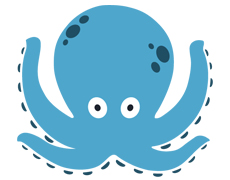Projects
Octopus.ac: Creating a new primary research record
Developing a ground-breaking global service which could positively disrupt research culture, making it easier to share work of all kinds.
Archived
This project was archived on
Length:4 years and 1 month
Expected outcome: New service

Sharing research quickly and openly, breaking down barriers to publishing and sharing research, and removing hierarchies are crucial factors if we’re to improve access to research.
What is Octopus and how will it help disrupt research culture?
Octopus is designed to provide a new primary research record for recording and appraising research as it happens. Unlike traditional journals, the platform breaks the research process up into eight publication types:
- Research problem
- Rationale/hypothesis method
- Results
- Analysis
- Interpretation
- Real world application
- Peer review
Octopus publications are linked together to form chains of collaborative work. These smaller units of publication encourage faster sharing, credit for specialists, and peer review at all stages of the research process.
The platform aims to foster a new culture of collaboration, open peer review and fast sharing of work, resetting the incentive structure and rewarding best practice in every aspect of the research process.
Free to read and free to publish, Octopus exemplifies principles of openness and transparency.
What are we doing?
We are building a tool for the research community, which is owned by the community. The platform has officially launched. Development activities continue as we strive to deliver the best possible service.
Upcoming technical developments include:
- Refining the design of Octopus based on user feedback
- Producing open API end points for all data
- Search enhancements
- Repository integration
Alongside this we are investing in:
- Marketing, outreach and user engagement
- A programme of evaluation and user research
- Work to develop a sustainable model for Octopus in the long term
Join the Octopus user community
A community for users of the Octopus service, and those interested in open science, research practice and related topics.






